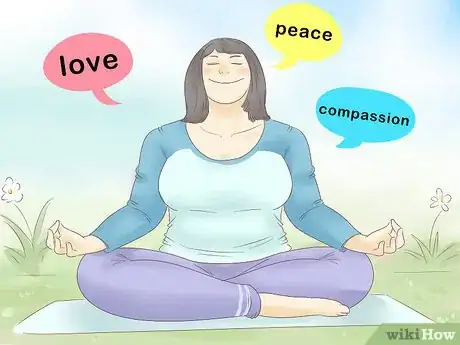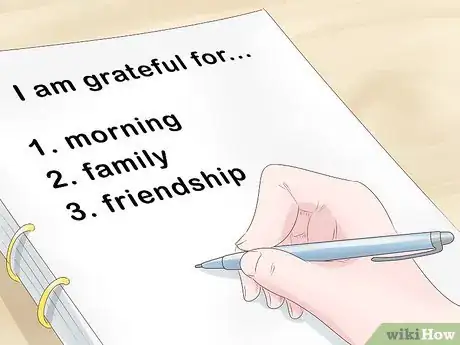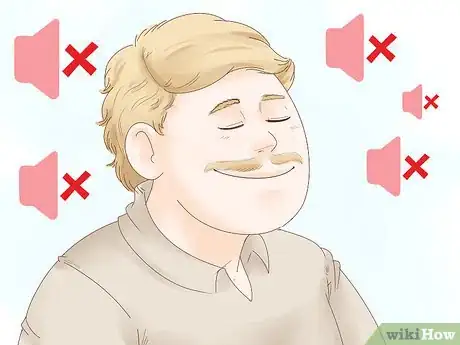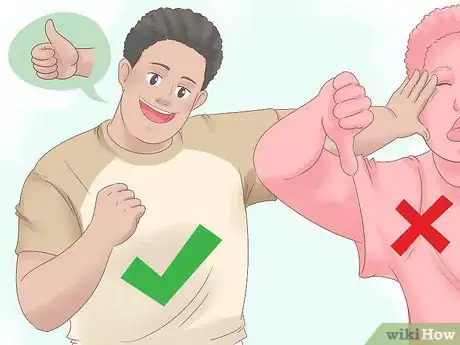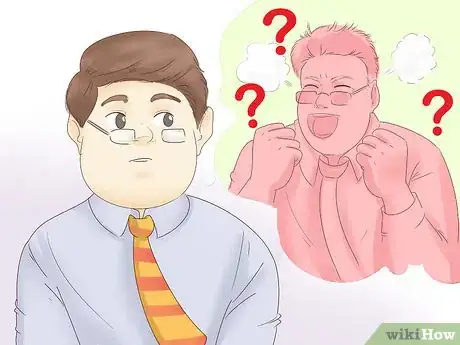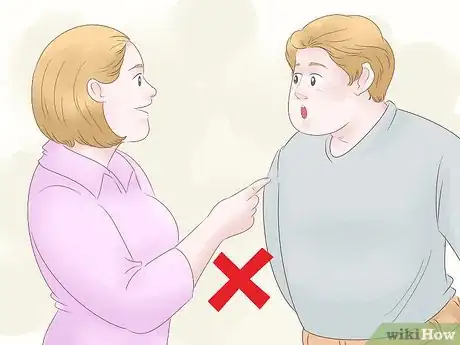This article was co-authored by Klare Heston, LCSW. Klare Heston is a Licensed Independent Clinical Social Worker based in Cleveland, Ohio. With experience in academic counseling and clinical supervision, Klare received her Master of Social Work from the Virginia Commonwealth University in 1983. She also holds a 2-Year Post-Graduate Certificate from the Gestalt Institute of Cleveland, as well as certification in Family Therapy, Supervision, Mediation, and Trauma Recovery and Treatment (EMDR).
There are 9 references cited in this article, which can be found at the bottom of the page.
This article has been viewed 51,844 times.
Your ego is the part of you that responds out of self-preservation and aims to build self-identity.[1] You may want to let go of your ego as a way to focus less on yourself and more on other people and the world around you. Use mindfulness techniques such as meditation, gratitude, and being present in the moment. Let go of fears that hold you back. Move forward by learning to relate to people authentically by listening and empathizing with them.
Steps
Using Mindfulness Techniques
-
1Be present in your daily life. Attend to each moment as it occurs. This means spending less time and energy focused on the past or the future. Instead of stewing over mistakes you’ve made or feeling anxious over what is to come, connect to the present by connecting to your senses. Your senses are always in the moment, so more awareness of them can help you feel grounded in the here and now.[2]
- For example, tune into each sense, one by one. Start by listening to all the sounds around you, such as the air conditioner or traffic going by. Then, focus on your sight and drink in all of the colors, textures, and depths that surround you. Continue with each sense.
-
2Meditate to detach from your ego. Meditation can help you detach from the thoughts that float through your head and connect you with a feeling of peace. When you meditate, detach from your thoughts and feelings and remember that they are not who you are.[3]
- Do a mantra meditation where you focus on one word, such as ‘compassion,’ ‘peace,’ or ‘love.’ this focuses your concentration externally and allows you to connect with these words.
- You can also do the loving kindness meditation, which places your focus on yourself and other people in your life by sending them kind and loving sentiments.
Advertisement -
3Practice gratitude daily. Get in the habit of expressing gratitude each day. You may want to start your day by thinking of what you are grateful for or end your day by creating your gratefulness list. Write 3 things each day that you are grateful for to keep a positive approach to every day. This can also help you focus less on yourself and more on the people and things around you.[4]
- Start a gratitude journal to get in the habit of giving thanks daily.
-
4Allow yourself to experience silence. It’s easy to tune into sounds all around you, whether they be noises from outside, other people, or even your own thoughts. Find a place that you can comfortably experience silence from the outside noises and inside chatter. Quiet your thoughts and just be.
- Silence can feel anxiety-provoking at first. Stick with it and learn to let go of the things around you, including your own thoughts and judgments.
-
5Express yourself authentically. Pretending you’re tough or that things don’t bother you is part of your ego. Find ways to express yourself through art, dance, journaling, or talking to someone you trust. Express the parts of yourself that feel most authentically you.[5]
- By having an outlet for expression, you can open yourself up deeply instead of hiding behind walls or pretending to be someone you are not. There are no parts of yourself that you need to shun.
Breaking Through Your Limitations
-
1Tell yourself you can reach your goals. Your ego can trap you into thinking you can’t do something or lack skills or abilities to try something new. Part of letting go of your ego means talking back to that voice that says that you’ll look silly or that people will think you’re strange if do something different or new.
- If you have a voice in your head that says you can’t or you shouldn’t do something, don’t let it keep you from your dreams.
-
2Let go of fear. Fear can hold you back and make you feel unworthy or undeserving. Your ego might hold onto fear, especially if you want to let it go. Confront the fears you have and be willing to take them on. Knowing that you can face things that scare you can build courage and begin to dismantle your ego.[6]
- Engage in activities that make you feel slightly fearful. For example, you may want to try a new food, begin a new hobby, or start dating again.
-
3Develop personal insight. Instead of responding as you usually do to life, think about why you think or act a certain way. Building insight into your motives, defenses, conflicts, and interactions can be done by taking a step back before you respond to something. You can also gain insight into past events by thinking about your motivations regarding your behavior.[7]
- For example, if you blew up at a family member this morning, ask yourself, “What made me lose my temper?” You might begin to realize that you feel agitated when you don’t get enough sleep or when you feel rushed.
-
4Recognize that your things don’t define you. Your ego might tell you that you have to have the nicest house, the best clothes, and the fanciest car in order to look good and keep up with those around you. If this sounds like you, remember that things don’t define you and are not who you are. People generally appreciate your character and who you are over what things you have.
- Instead of focusing on things, focus on your character. Aim to be kind, respectful, and considerate. For example, make a point of saying, "Hello" and "Good morning" to people you pass.
Connecting to People More Meaningfully
-
1Forgive people who have wronged you. Feeling justified, angry, bitter, and resentful often stops people from forgiveness. Holding on to negative thoughts and feelings doesn’t help you feel better or encourage you to let go. Consciously free yourself from these feelings by not harboring negativity toward other people. While this may not happen all at once, let go little by little.[8]
- Forgiveness doesn’t mean you forget what happened or pretend like they didn’t hurt you. Remember that forgiveness is more for you than it is for anyone else.
- Write a letter to a person without the intention of giving it to them. Write down the situation and why it upset you, then write that you forgive them. Symbolically release your hurt and pain by burning the letter or tearing it up.
-
2Empathize with others. Empathy is a way to relate to other people. Instead of focusing on yourself, you focus on what another person is thinking and feeling so that you can understand them better. Place more focus on understanding the experiences of others to build empathy.[9]
- For example, imagine what it would be like to live somebody else’s life - with all of their circumstances - and how that would make you feel.
-
3Be open to other opinions and viewpoints. You’ll undoubtedly meet people you disagree with or don’t get along with. Instead of digging your heels in further to defend your own thoughts and opinions, hear theirs out. Listen closely and seek to understand other people. Spend less time explaining yourself and more time gaining an understanding of someone else.[10]
- Your ego will tell you to defend yourself or that the other person’s viewpoint is invalid or stupid. Push these thoughts aside and seek to understand the differences more.
-
4Stop trying to control other people. If you think that you always know best for other people, recognize that this is part of your ego. Even if you disagree with someone, don’t feel the need to tell them what to do or give them advice. While it’s nice to be helpful, don’t be pushy.[11]
- If you want to provide your opinion or advice, first ask, “Can I give you my opinion?” or, “Would you like some advice?”
Expert Q&A
-
QuestionHow do I dissolve my ego?
 Klare Heston, LCSWKlare Heston is a Licensed Independent Clinical Social Worker based in Cleveland, Ohio. With experience in academic counseling and clinical supervision, Klare received her Master of Social Work from the Virginia Commonwealth University in 1983. She also holds a 2-Year Post-Graduate Certificate from the Gestalt Institute of Cleveland, as well as certification in Family Therapy, Supervision, Mediation, and Trauma Recovery and Treatment (EMDR).
Klare Heston, LCSWKlare Heston is a Licensed Independent Clinical Social Worker based in Cleveland, Ohio. With experience in academic counseling and clinical supervision, Klare received her Master of Social Work from the Virginia Commonwealth University in 1983. She also holds a 2-Year Post-Graduate Certificate from the Gestalt Institute of Cleveland, as well as certification in Family Therapy, Supervision, Mediation, and Trauma Recovery and Treatment (EMDR).
Licensed Social Worker You don't need to do away with it entirely! An ego serves some positive purposes as well. Just 'sand' it down around the edges. Become more aware of the people around you; ask about their interests and lives; and put their needs above your own some of the time.
You don't need to do away with it entirely! An ego serves some positive purposes as well. Just 'sand' it down around the edges. Become more aware of the people around you; ask about their interests and lives; and put their needs above your own some of the time. -
QuestionHow do I kill my ego?
 Klare Heston, LCSWKlare Heston is a Licensed Independent Clinical Social Worker based in Cleveland, Ohio. With experience in academic counseling and clinical supervision, Klare received her Master of Social Work from the Virginia Commonwealth University in 1983. She also holds a 2-Year Post-Graduate Certificate from the Gestalt Institute of Cleveland, as well as certification in Family Therapy, Supervision, Mediation, and Trauma Recovery and Treatment (EMDR).
Klare Heston, LCSWKlare Heston is a Licensed Independent Clinical Social Worker based in Cleveland, Ohio. With experience in academic counseling and clinical supervision, Klare received her Master of Social Work from the Virginia Commonwealth University in 1983. She also holds a 2-Year Post-Graduate Certificate from the Gestalt Institute of Cleveland, as well as certification in Family Therapy, Supervision, Mediation, and Trauma Recovery and Treatment (EMDR).
Licensed Social Worker You don't have to kill it, just tame it some! Develop more empathy for others. Ask about the other person instead of always talking about yourself. Spend some time being quiet or meditating.
You don't have to kill it, just tame it some! Develop more empathy for others. Ask about the other person instead of always talking about yourself. Spend some time being quiet or meditating. -
QuestionHow do I stop feeding my ego?
 Klare Heston, LCSWKlare Heston is a Licensed Independent Clinical Social Worker based in Cleveland, Ohio. With experience in academic counseling and clinical supervision, Klare received her Master of Social Work from the Virginia Commonwealth University in 1983. She also holds a 2-Year Post-Graduate Certificate from the Gestalt Institute of Cleveland, as well as certification in Family Therapy, Supervision, Mediation, and Trauma Recovery and Treatment (EMDR).
Klare Heston, LCSWKlare Heston is a Licensed Independent Clinical Social Worker based in Cleveland, Ohio. With experience in academic counseling and clinical supervision, Klare received her Master of Social Work from the Virginia Commonwealth University in 1983. She also holds a 2-Year Post-Graduate Certificate from the Gestalt Institute of Cleveland, as well as certification in Family Therapy, Supervision, Mediation, and Trauma Recovery and Treatment (EMDR).
Licensed Social Worker Reduce your use of "I" this or "I" that...Stop bragging about yourself and your accomplishments. Try going an entire hour, and later an entire evening, without talking about yourself. Reduce the amount of time you spend looking into the mirror.
Reduce your use of "I" this or "I" that...Stop bragging about yourself and your accomplishments. Try going an entire hour, and later an entire evening, without talking about yourself. Reduce the amount of time you spend looking into the mirror.
References
- ↑ https://www.psychologytoday.com/blog/theory-knowledge/201306/the-elements-ego-functioning
- ↑ https://www.psychologytoday.com/articles/201411/let-it-go
- ↑ https://www.nytimes.com/guides/well/how-to-meditate
- ↑ https://www.health.harvard.edu/healthbeat/giving-thanks-can-make-you-happier
- ↑ https://psychcentral.com/blog/a-mini-guide-for-expressing-yourself-effectively-with-anyone
- ↑ https://www.nhsinform.scot/healthy-living/mental-wellbeing/fears-and-phobias/10-ways-to-fight-your-fears
- ↑ https://www.psychologytoday.com/blog/theory-knowledge/201306/the-elements-ego-functioning
- ↑ https://greatergood.berkeley.edu/article/item/eight_keys_to_forgiveness
- ↑ https://www.psychologytoday.com/blog/theory-knowledge/201306/the-elements-ego-functioning
About This Article
To let go of your ego, make an effort to be more mindful of the present moment so you're not dwelling on the past or stressing out about the future. Also, try to stop hiding behind walls or pretending to be someone you're not, which is just your ego trying to protect itself. Instead, express how you really feel, and don't be afraid to be vulnerable with people. Additionally, let go of any fears your ego is holding onto by facing them and putting yourself out of your comfort zone. For more advice from our Social Worker co-author, like how to connect with people authentically, read on!

